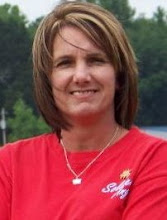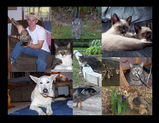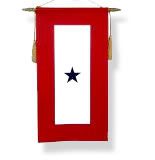PTSD FROM A PARENTS EYES
PTSD is a subject no one wants to discuss, but for one Mom, she feels it necessary to let the world know just what it does to your sons, daughters, husbands and wives, Thanks SSM for sharing your story with us.
When Noah deployed for his first tour in Iraq, there was no describing the worry. It was intense. It was consuming. It permeated every minute of every day. Like our skin or our heartbeats, it was with us and around us and in us no matter what we did or where we were.
When he was wounded, the worry was like a crushing weight on us. Even when we knew his injuries would not be fatal, the worry of what the future held for Noah was a new kind of worry, but one we told ourselves that we would gladly bear.
After Noah was well on his way to physical recovery, it was apparent to us that the person we had raised and known -- the bright, witty upbeat spirit with that generally cheery personality and always optimistic outlook -- was not the person that returned from Iraq. Of course, we know that if war did not affect a person, they wouldn't be human; but as my girlfriend S. might say, "if it wasn't the same face and the same name, I'd swear on a stack of Bibles that this isn't my son."
Noah was diagnosed with Post-Traumatic Stress Disorder shortly after he was wounded; at the time, however, the treatment of his physical wounds took precedence. And the deaths of so many in his unit while he recovered -- especially the deaths of five of his squad in a single attack -- seemed to numb him for a while. We recognized the short temper and his quick anger as signs of PTSD... and he admitted that sleep was hard to come by and interrupted by thrashing and nightmares when it did come. We encouraged him to seek treatment... and we worried.
Noah recognized that he was "messed up" (his words) and figured he needed help for the PTSD and shared that with his [now former] NCO, Sgt. M -- who would always dismiss his concerns with, "Suck it up and drive through it... everybody has PTSD." So Noah sucked it up and drove on... thinking that time would make it better and that he could handle it on his own. That's what most 19 and 20 and 40 year old soldiers tell themselves. Many of his buddies were doing the same: sucking it up and driving on.
It went on for many months until Noah could take no more of the escalating "dark thoughts", nightmares, depression and crushing panic and anxiety that ruled his existence and he sought counseling. After some pretty harrowing episodes which left us (his parents) distraught and shaken, he was admitted for inpatient care. After a number of serious setbacks and the doc trying more drug combinations than we thought possible, he was discharged after 8 weeks. He refused the opportunity to seek a medical discharge and returned to duty.
Noah has continued treatment but the medications have not been totally successful in controlling his PTSD and he is still beset by this illness. Contrary to the WaPo's assertions of "combat-addled" or the "drugged up" profile they'd have you believe (and yes, there are some), for the many soldiers we have become acquainted with being treated for their PTSD, the medications allow them to exist with some normalcy in their lives while they heal. And since there is no single drug or treatement for the complex array of the human brain's responses to trauma as significant and repetitive as WAR, a combination of drugs is used to treat the menu of symptoms that may present in each individual: nightmares, insomnia, anxiety, depression. If those writers had done even a small amount of research, they'd have known that those drugs help soldiers survive. It is a daily battle and we follow Noah's closely. Because of the instransigence of Noah's PTSD, late last week Noah's doctors profiled him as "no go" and he will not deploy to Iraq with his unit next month.
And he may not be able to stay in the Army. Noah was initially upset about it; he understands the "no deploy" profile (he admits that he is no shape to go despite his best efforts), but he has wanted to be a soldier for most of his 21 years and the idea of leaving the Army has been very hard for him to accept. And he adds to that his desire to continue with the "joes" he has trained so hard with and helped train in preparation for this deployment.
It's an odd position for us to be in: we hurt for him because his disappointment is so heavy at the moment, but at the same time, as a mom, I cannot say that I am sorry that he is not going back to Iraq.
We are so proud of Noah for what he has accomplished and what he has survived -- and even prouder because of his desire to carry on even with the PTSD... and in light of his first "experience" in Iraq... and this battle which he has fought exhaustingly for more than a year... one we have no doubt in which he will prevail. We and his entire family will be with him every step of the way.
And, yes, we still believe in our troops AND their mission. We have one son "home" but we still have 150,000 sons and daughters still deployed (including a bunch of Our Guys).
Remember those who have left the battlefield but now fight the battle at home.
Copyright Some Soldier's Mom 2007. All rights reserved.
* We have become somewhat conversant in the Army's "system" regarding the treatment and the attitudes reagrding PTSD. There will be a much longer and more detailed post on this topic in the future...
When he was wounded, the worry was like a crushing weight on us. Even when we knew his injuries would not be fatal, the worry of what the future held for Noah was a new kind of worry, but one we told ourselves that we would gladly bear.
After Noah was well on his way to physical recovery, it was apparent to us that the person we had raised and known -- the bright, witty upbeat spirit with that generally cheery personality and always optimistic outlook -- was not the person that returned from Iraq. Of course, we know that if war did not affect a person, they wouldn't be human; but as my girlfriend S. might say, "if it wasn't the same face and the same name, I'd swear on a stack of Bibles that this isn't my son."
Noah was diagnosed with Post-Traumatic Stress Disorder shortly after he was wounded; at the time, however, the treatment of his physical wounds took precedence. And the deaths of so many in his unit while he recovered -- especially the deaths of five of his squad in a single attack -- seemed to numb him for a while. We recognized the short temper and his quick anger as signs of PTSD... and he admitted that sleep was hard to come by and interrupted by thrashing and nightmares when it did come. We encouraged him to seek treatment... and we worried.
Noah recognized that he was "messed up" (his words) and figured he needed help for the PTSD and shared that with his [now former] NCO, Sgt. M -- who would always dismiss his concerns with, "Suck it up and drive through it... everybody has PTSD." So Noah sucked it up and drove on... thinking that time would make it better and that he could handle it on his own. That's what most 19 and 20 and 40 year old soldiers tell themselves. Many of his buddies were doing the same: sucking it up and driving on.
It went on for many months until Noah could take no more of the escalating "dark thoughts", nightmares, depression and crushing panic and anxiety that ruled his existence and he sought counseling. After some pretty harrowing episodes which left us (his parents) distraught and shaken, he was admitted for inpatient care. After a number of serious setbacks and the doc trying more drug combinations than we thought possible, he was discharged after 8 weeks. He refused the opportunity to seek a medical discharge and returned to duty.
Noah has continued treatment but the medications have not been totally successful in controlling his PTSD and he is still beset by this illness. Contrary to the WaPo's assertions of "combat-addled" or the "drugged up" profile they'd have you believe (and yes, there are some), for the many soldiers we have become acquainted with being treated for their PTSD, the medications allow them to exist with some normalcy in their lives while they heal. And since there is no single drug or treatement for the complex array of the human brain's responses to trauma as significant and repetitive as WAR, a combination of drugs is used to treat the menu of symptoms that may present in each individual: nightmares, insomnia, anxiety, depression. If those writers had done even a small amount of research, they'd have known that those drugs help soldiers survive. It is a daily battle and we follow Noah's closely. Because of the instransigence of Noah's PTSD, late last week Noah's doctors profiled him as "no go" and he will not deploy to Iraq with his unit next month.
And he may not be able to stay in the Army. Noah was initially upset about it; he understands the "no deploy" profile (he admits that he is no shape to go despite his best efforts), but he has wanted to be a soldier for most of his 21 years and the idea of leaving the Army has been very hard for him to accept. And he adds to that his desire to continue with the "joes" he has trained so hard with and helped train in preparation for this deployment.
It's an odd position for us to be in: we hurt for him because his disappointment is so heavy at the moment, but at the same time, as a mom, I cannot say that I am sorry that he is not going back to Iraq.
We are so proud of Noah for what he has accomplished and what he has survived -- and even prouder because of his desire to carry on even with the PTSD... and in light of his first "experience" in Iraq... and this battle which he has fought exhaustingly for more than a year... one we have no doubt in which he will prevail. We and his entire family will be with him every step of the way.
And, yes, we still believe in our troops AND their mission. We have one son "home" but we still have 150,000 sons and daughters still deployed (including a bunch of Our Guys).
Remember those who have left the battlefield but now fight the battle at home.
Copyright Some Soldier's Mom 2007. All rights reserved.
* We have become somewhat conversant in the Army's "system" regarding the treatment and the attitudes reagrding PTSD. There will be a much longer and more detailed post on this topic in the future...
















1 comment:
I am a Vietnam vet that has PTSD. FYI it is treatable, my care has been provided by the West Palm Beach, Fl VAMC, with great success. It took me 30 years to get there but the relief is wonderful.
Post a Comment